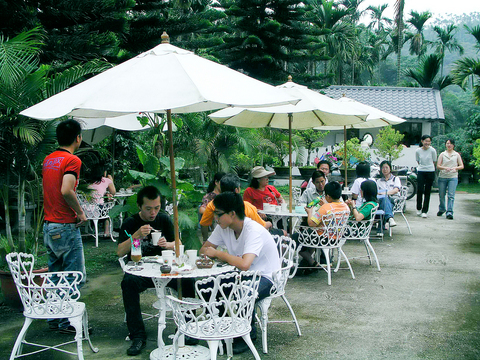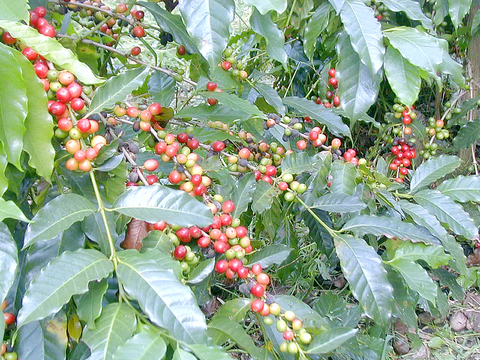Like any given day in her past 10-year coffee career, Liu Fu-mei (劉富美) on a normal Saturday afternoon was making coffee using siphon brewers to serve customers in Gukeng (古坑) Township, Yunlin County.
However, this shopkeeper at Barden Coffee (巴登咖啡) was not brewing coffee imported from just any coffee-growing place, like Columbia or Indonesia, but the Arabica coffee grown locally in Taiwan.
"Unknown to even most natives, Taiwan actually grows coffee beans," said Barden's owner Chang Lai-en (張萊恩), who recalled when he was a child his father and other local coffee farmers planted the trees in Gukeng's Hobaoshan (荷苞山) region, also nicknamed 'Coffee Hill.'

PHOTO: CHUANG YU-FENG, TAIPEI TIMES
"When the coffee matures, you can see the mountain covered with beautiful ruby-red beans," 50-year-old Chang said.
The history of coffee production in Taiwan dates back to the Qing Dynasty in the 1880s, when a British businessman for Tait & Co brought several nursery coffee plants to be grown in what was then Taipei County, but on a very small scale.
The golden age of the nation's coffee industry started in 1902, when the colonial Japanese government decided to develop this lucrative crop, mainly in Gukeng, which had suitable soil and a subtropical climate. More than 1,000 hectares of coffee were planted at the time, of which Gukeng alone made up more than 700 hectares.

PHOTO: LIAO SHU-LING, TAIPEI TIMESN
Apart from supporting the development of the coffee industry, Japanese rulers also set up factories to process, grind and roast the beans, and established distribution channels to ship the coffee back to Japan. Taiwan became the capital of coffee production in the Ear East at the time.
The good old days, however, did not last long. Following the end of the Japanese 50 year-rule in 1945, coffee producers faced a disruption in export ties with Japan, while domestically they were in a very awkward position to produce coffee with only a very limited market for their crops. Coffee production slowed, while other crops, such as green oranges and bamboo shoots, continued to thrive.
As a pioneer in revitalizating the industry, Chang started a coffee venture in 1984 but sustained years of slow growth. Today, he has over 10 Barden outlets across the nation and his store is known for the rare and more pricey "Taiwan Coffee" made from beans which Chang has grown, harvested and baked himself for over 20 years. He admitted that it was not an easy road, with the way paved for him.
"Taiwan was a desert of coffee culture at that time," he said.
But things changed after a meeting with Hsieh Shu-ya (
With Chang's assistance, Hsieh tried a new strategy: the launch of a "Taiwan Coffee Festival" in 2003, designed to raise the visibility of the rural township, and to put a spotlight on the industry.
Last year, the 50-day Taiwan Coffee Festival drew over a million tourists and infused NT$1 billion into the local economy -- ? more than three times the amount made in 2003 (NT$300 million).
Hsieh said she expected to see a similar or an even greater response to this year's festival, which is slated to kick off on Sept. 30 and run through the end of November.
Thanks to the `brown gold,' the size of the coffee-growing area in Gukeng has now shot to over 150 hectares from the original 4.5-hectares owned by Chang.
Over the past few years, around 70 coffee shops have been springing up all over Gukeng's Huashan area (華山). Crowds of people are now surging to Gukeng just to sip a cup of coffee. The downside, however, is the traffic congestion to get there on weekends.
"Coffee is such a magic bean! Isn't it?" Hsieh said.
Janfusan Fancy World (
"We saw our revenues in the fourth quarter of last year jump by 20 percent from a year ago, thanks to the increasingly grander festival," Janfusan's president James Hsiao (蕭柏勳) said.
The amusement park expected its sales in the last quarter of this year to increase by 10 percent or more year-on-year, Hsiao said.
"We run the event as if building a brand, and work to ensure high quality standards are maintained, so that we keep attracting people," he said.
Despite all the seeming prosperity, the business of coffee production has its limitations in Taiwan.
"Taiwan's coffee production has no pricing edge over imported coffee," said Wu Yi-ling (
The cost of land and manpower to grow coffee in Taiwan is 30 to 40 times that of other countries like Indonesia, Vietnam, Brazil or other Central and Southern American nations, Wu explained.
Taiwan is also subject to natural disasters, like typhoons, which can cause extensive crop damage, further reducing the efficiency of a single growing area, and in turn raising the cost, she said.
Take the locally grown coffee, or the so-called "Taiwan Coffee." This mild-roast coffee is known for its rich flavor, said to be similar in taste to Jamaican Blue Mountain. But because of a high production cost and a small-scale production that can only fulfill domestic consumption, Taiwan Coffee is usually priced at over NT$1,000 per pound, compared to imported beans sold for about NT$500 to NT$600 per pound, according to Chang.
Instead of relying on domestic consumption alone, Taiwan's coffee-growing business should take advantage of its refined, small-scale and tourism-oriented agriculture in order to attract Japanese and Chinese visitors, Wu said.
"It is quality, not quantity that matters. The business can position itself as a specialty coffee to tap into the niche market," she said.
Another risk facing the sector is the farmers' lack of awareness in brand-building, as consumers discovered in October last year when some instant coffee powders labeled "Taiwan Coffee" were found to be inferior products mixed with imported, low-grade coffee. The incident to some extent hurt consumer confidence in Gukeng's coffee.
In response, the township authority required farmers and manufacturers to clearly and correctly label blended coffee products, which they agreed to do, Hsieh said.
"Do as internationalized standards do," and then farmers and producers can be more alert to protecting goodwill toward the industry, and helping good business practices prevail, Wu said.
There remains the concern that the fledgling sector could fade after Mayor Hsieh's term ends at the end of this year, entailing the loss of one of the industry's most tireless promoters.
But Hsieh responded that the public sector has already "lit the fire," and that she hoped to eventually pass on the torch to the private sector to share the benefits and prosperity, including local coffee businesses and tour operators.
Also, developing diverse coffee by-products such as sweets, food or even decorations could be the way to go in the future, she said.
Taiwan, which manufactures over 70 percent of the world's espresso machines, could be an ideal place to hold global coffee fairs to gather together upscale and to small-scale coffee-related businesses, and this could help the nation's coffee commerce continue rolling, Hsieh said with optimism.

Meta Platforms Inc offered US$100 million bonuses to OpenAI employees in an unsuccessful bid to poach the ChatGPT maker’s talent and strengthen its own generative artificial intelligence (AI) teams, OpenAI CEO Sam Altman has said. Facebook’s parent company — a competitor of OpenAI — also offered “giant” annual salaries exceeding US$100 million to OpenAI staffers, Altman said in an interview on the Uncapped with Jack Altman podcast released on Tuesday. “It is crazy,” Sam Altman told his brother Jack in the interview. “I’m really happy that at least so far none of our best people have decided to take them

BYPASSING CHINA TARIFFS: In the first five months of this year, Foxconn sent US$4.4bn of iPhones to the US from India, compared with US$3.7bn in the whole of last year Nearly all the iPhones exported by Foxconn Technology Group (富士康科技集團) from India went to the US between March and last month, customs data showed, far above last year’s average of 50 percent and a clear sign of Apple Inc’s efforts to bypass high US tariffs imposed on China. The numbers, being reported by Reuters for the first time, show that Apple has realigned its India exports to almost exclusively serve the US market, when previously the devices were more widely distributed to nations including the Netherlands and the Czech Republic. During March to last month, Foxconn, known as Hon Hai Precision Industry

PLANS: MSI is also planning to upgrade its service center in the Netherlands Micro-Star International Co (MSI, 微星) yesterday said it plans to set up a server assembly line at its Poland service center this year at the earliest. The computer and peripherals manufacturer expects that the new server assembly line would shorten transportation times in shipments to European countries, a company spokesperson told the Taipei Times by telephone. MSI manufactures motherboards, graphics cards, notebook computers, servers, optical storage devices and communication devices. The company operates plants in Taiwan and China, and runs a global network of service centers. The company is also considering upgrading its service center in the Netherlands into a

Taiwan’s property market is entering a freeze, with mortgage activity across the nation’s six largest cities plummeting in the first quarter, H&B Realty Co (住商不動產) said yesterday, citing mounting pressure on housing demand amid tighter lending rules and regulatory curbs. Mortgage applications in Taipei, New Taipei City, Taoyuan, Taichung, Tainan and Kaohsiung totaled 28,078 from January to March, a sharp 36.3 percent decline from 44,082 in the same period last year, the nation’s largest real-estate brokerage by franchise said, citing data from the Joint Credit Information Center (JCIC, 聯徵中心). “The simultaneous decline across all six cities reflects just how drastically the market